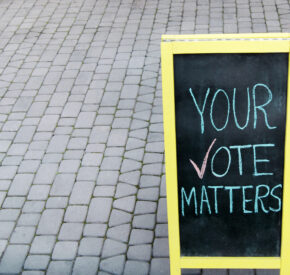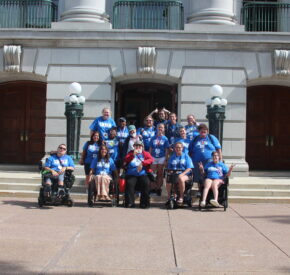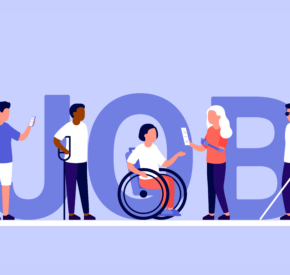Tamman @ AccessU 2023 Retrospective

AccessU Recap – A place of progress over perfection
The Tamman Team arrived at St. Edward’s University in Austin, TX, for the 2023 John Slatin AccessU conference by Knowbility. We attended for the opportunity of deep learning in digital accessibility and to do some meaningful networking. The conference was held May 9 – 12 this year, and this was the second time that Tamman attended this conference in person. Its reputation for being a classroom-based conference without the barrage of sales did not disappoint.
Key Takeaways include:
- Listening and Learning from some of our favorite presenters
- Strong networking at AccessU compared to our previous 2023 conferences
- Got connected into an exciting new project we are cooking up
- Thoughts on this large-scale hybrid event
- Conference resources that are bite-sized, sendable, and come in different formats
High-level insight
One of the core themes AccessU hammered home was the need to go beyond checklists and compliance requirements for web accessibility. We were excited to learn that others share our thinking that quality digital accessibility starts with the user experience. To put it simply, digital accessibility isn’t an extra step at work; it’s just part of the work.
Listening and Learning
One of the key reasons we attend conferences is to grow as professionals and increase our knowledge base. So, we were thrilled that AccessU was stuffed to the gills with high-quality accessibility subject matter experts (SMEs).
Tamman-favorite Meryl Evans gave an excellent presentation on creating accessible social media content. This was highlighted by her message of process over perfection.
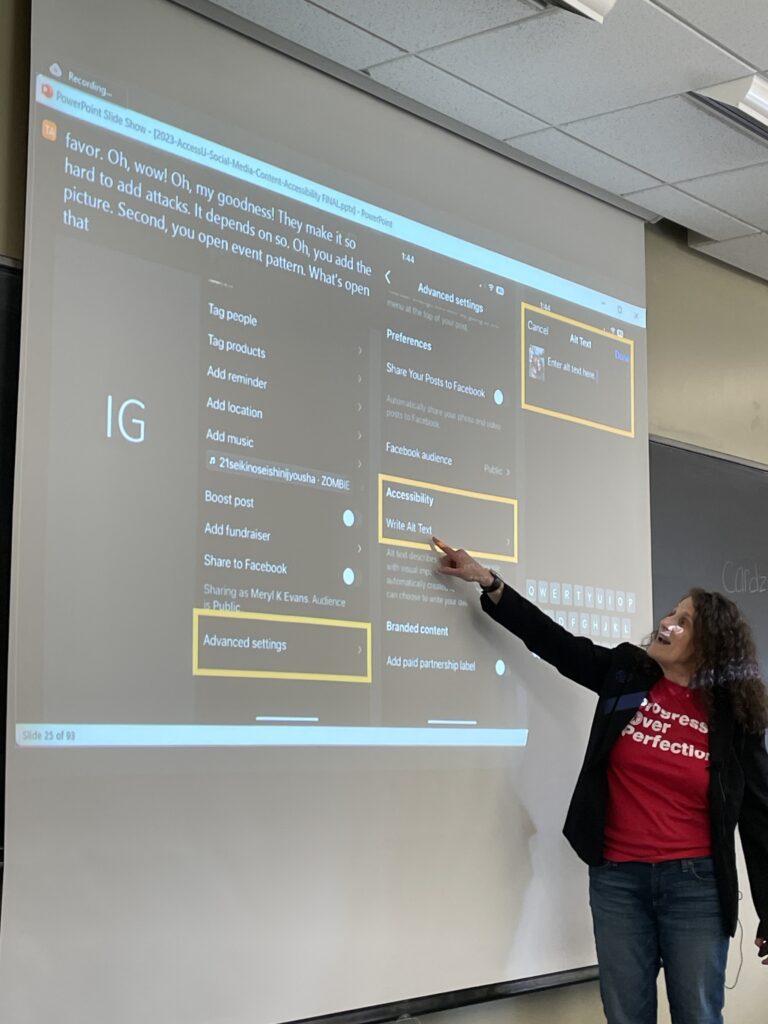
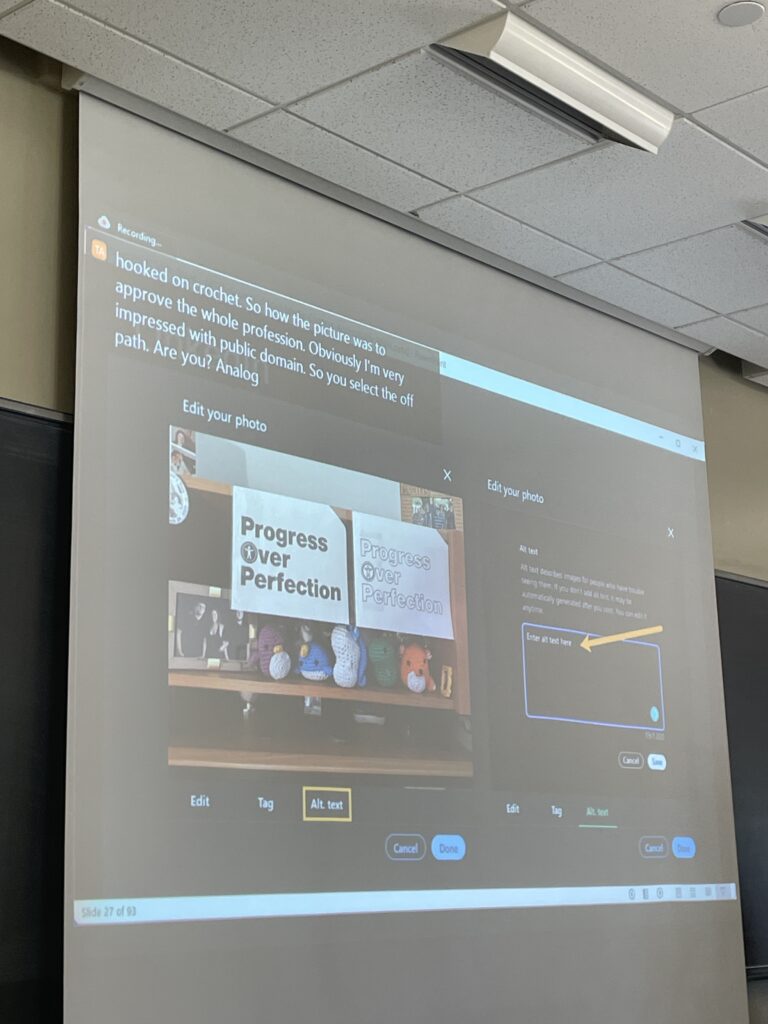
Our data chief Emma attended an excellent presentation from Karl Groves on how to structure alt text for data visualizations. This format isn’t a one-size-fits-all for alt text, but it is an excellent starting point.
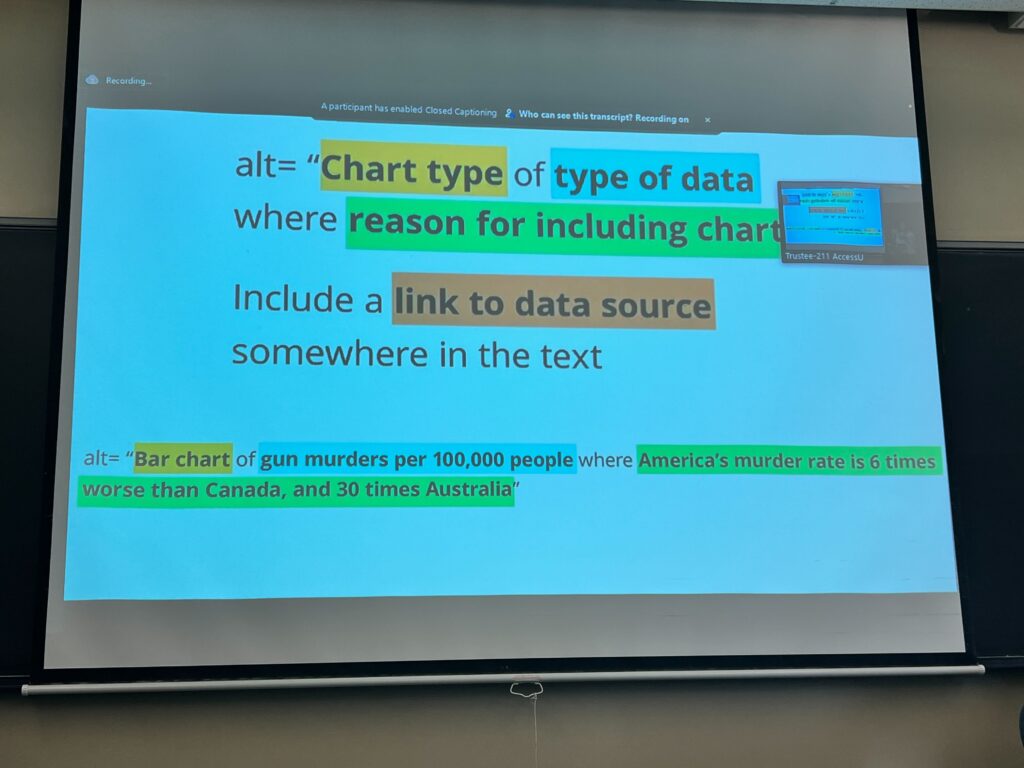
Dr. Chris Law, the head of Standard Accessible Reporting Inc., gave a talk on the mockup of accessibility standards on products (like the dishwasher) on Amazon. We want this to be standard across industries, such as nutrition labels on all consumer food products. We’ve had some quick follow up with Dr. Law and are thrilled to now be strategic partners in the push for Standard based reporting for accessibility. More on that below.
Documents
Our accessible documentation chief Liza attended a panel on accessible word templates. Crystal Gonzales and Nancy Abee of the Texas Health and Human Services led this discussion. One of our favorite takeaways was how they deploy new and updated templates. Follow up with the Texas Human and Health Services website to find a variety of Microsoft Office accessibility tools.
Plain Language
One of the discussion points at AccessU was the need for plain language in all written contexts. This includes official documents, digital content, and technical information. This re-emphasized an internal priority at Tamman to use plain language throughout all our content. Using clear language effectively is crucial to get more readers to read and digest your piece. Our team realized this in human centered thought leader Elisa Miller’s talk titled; Plain Language: Increasing the Accessibility of Your Content. She explained that the goal is for your audience to understand the meaning of your words the first time they read or hear them. They need to know “Where am I, what can I do here, and where can I go from here?” The text is not plain enough if that information isn’t clearly communicated within a few seconds.
This isn’t just the accessibility community talking; the US government also agrees on the need for plain language. To illustrate the need for clear language, imagine reading your parents’ favorite newspaper as a kid. The plain language helped you pick out key pieces of information and understand the general purpose of the article. For the words that were more difficult to understand, the context clues likely helped you figure out what those words meant.
Compare this to a legal contract. For those of us not familiar with the legal profession, documents written in “legal-ese” are difficult to understand. Sure, we can do thorough research, look up words and phrases individually, and ask someone in the know to figure out precisely what the text means.
Now, imagine committing that mental effort to understand basic information for taxes, education documents, and local government meetings. Eventually, many people will get turned off by this and decide to ignore these complex documents altogether. While the more technical language may be more thorough and accurate, it is not always more helpful. After all, did you read through every single tough article in the newspaper growing up, or did you skip to the more light and breezy sections?
Networking
We loved Knowbility’s AccessU for many reasons. One of them was the intimate, communal environment that the conference facilitated. This conference didn’t include an expo hall, and sales or products didn’t drive the communication and purpose of the conference. Knowbility focused on deep learning in classrooms. This allowed us to forge more human relationships with our accessibility colleagues. Instead of pitching a sale, we pitched our interests, ideas, and goals with our fellow attendees based on what we learned after each panel.
We aren’t against conferences that emphasize sales, pitches, and project collaboration. Quite the contrary, actually. We are fans of this space and the achievements it makes possible in all industries, including ours. However, we also want to make space for conferences that network based on mutual discovery instead of mutual transactions.
Standards Based Reporting
Following the conference, Tamman joined Standard Accessibility Reporting (SAR). This is a group of industry professionals joining together to officially agree upon one simple way for procurement officers, consumers, and anyone concerned about accessibility to easily review and understand where a digital or consumer product rates. This endeavor will take time, but it is long overdue, and we are thrilled to be a part of this work moving forward. We will be writing about the progress of this project in the future.
The need for advocacy
One of our more esoteric takeaways from AccessU was that there is a need for an organization dedicated to lobbying for digital accessibility in government. There are wonderful groups whose advocacy touches upon digital accessibility, but it is mixed in with advocacy for the built environment and other priorities. As far as we’ve discovered, no major organization is directly centered on this. We will continue to discuss and research if there are existing groups focused on digital accessibility advocacy, and if not, perhaps begin to bring the resources to bear for such an endeavor.
A note about the hybrid format of the conference from Marty Molloy
While The Tamman Team was all in person, this year’s conference was put on in a hybrid format offering an online experience as well. I appreciated the best efforts and a team of folks dedicated to creating a more holistic experience but was ultimately let down by its execution.
I think the hybrid structure has a long way to go to pull it off effectively for all audiences. Each session we attended had tech issues, either from the software being used or the presenters not being trained to navigate Zoom, or the hardware in the room. It led to inefficiencies in person, but I imagine it must be much worse for those online. I understand the reasoning behind wanting to make the conference available to those who cannot attend, cannot travel, or are still worried about their health. However, without the resources necessary to pull it off well, the experience was poor for presenters and attendees.
In addition, for a conference dedicated to inclusion, the hybrid format makes implementing inclusive best practices very inconsistent. Rarely did speakers describe themselves, and rarely did questioners introduce themselves. Oftentimes the closed captions did not appear until at least 10 minutes into the presentation beginning, or were blocking key information on slides, or did not follow the basic rules that someone like Meryl Evans was teaching, i.e., two lines, limited characters, and large enough to see. Taking the time to lay out customs and inclusive practices would benefit all presenters and attendees in person or online.
Lastly, because the experience online is not anywhere close to the in-person experience, the price of tickets would not be the same either. This is an organizational choice, but I hope the organizers consider revising in the future. These constructive criticisms are made in the spirit of supporting this great conference. For me, AccessU is the best conference I have ever attended in my career, and I think it can be even better with some attention on these matters.
Resource Section from AccessU:
Conference Slide Decks:
Leslie O’Flahavan and Susan Price’s AccessU presentation on The Right to Understand digital content
A slide deck on hosting accessible Zoom meetings
Websites:
The US government’s perspective on the need for plain language
2023 report of the accessibility status of the top 1,000,000 web pages
Accessible University Demo Site
Books and Podcasts:
A suggested book: DisCrit—Disability Studies and Critical Race Theory in Education
Another suggested book: Care Work: Dreaming Disability Justice


